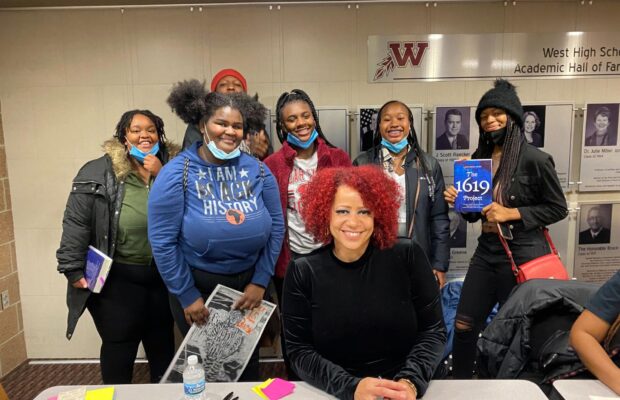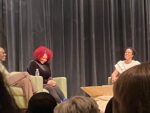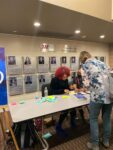Pulitizer Prize-winning journalist kicks off book tour in her native Waterloo

Nikole Hannah-Jones, famous for her Pulitzer Prize winning “1619 Project,” kicked off her tour at Waterloo West High High to discuss her new books on Nov. 23 from 7 to 8 p.m. Born and raised in Waterloo, Hannah-Jones decided to have one of her book talks at the same school she attended when she was younger. At the event, she explained her inspirations, life and more.
The 1619 Project idea came to life in a black studies class taught by Ray Dial, which inspired Nikole the most.
“Black studies class made me realize how much history black people had, and it’s embarrassing to admit that you could grow up thinking you didn’t have much history.”
Not living in the western part of the town triggered Hannah-Jone’s curiosity furthermore. She questioned everything on her one-hour bus ride home and to school.
“We rode the bus about two hours every day, an hour each way, and I will see how everything about the community changed as you got closer to the Westside. How there were more grocery stores, how there were more restaurants, that’s where the malls were, pharmacies and just normal things that a community had that we didn’t have.”
With these thoughts running through her head like a train track that never ends, she decided to learn more about the unknown, leading Hannah-Jones into majoring in African American history. “Educational experience is what led me to do the type of work that I wanted to do.”
At West, Dial was the one that inspired her to journalism, which was a stepping stone toward who she is now. “Power of educators to transform students’ lives, and Mr. Dial certainly did that for me. He was the only black teacher I ever had.”
The new book begins in 1619 from the first enslaved from Africa to Virginia and ends in today’s times with George Floyd’s death.
Author Notes
“The book is based on scholarship. Sixty years of scholarship, citing a dozen historians,” Hannah-Jones said. “I hope this 1619 project is like the red pill in The Matrix. If you read this project, you can’t see the world the same. Suddenly, you see all the coding that creates inequality in the environment you live in. We’re in a country right now that wants us to take the blue pill. It’s why we see all across the country these laws that are trying to stop us from learning our history, our true history. If you understand, if we don’t learn history that tells us how all of us were created, then we don’t have policies that undo it. Instead, we have passed policies that sustain the inequality, and that’s why I do the work that I do. At the back of the book, on the bottom, there is a list of a few of America’s greatest living writers. Not the greatest living black writers, but the America greatest living writers, who are also all black. This book is a testament and a testimony of black resilience, black resistance and black struggle. A testament to the ancestors and the more than 30 million descendants of slavery.”
Evidence of Black Joy
Hannah-Jones said she was surprised by her editor. Every essay starts with a photo of black people, not historical heroes, but usual black people living their lives because all of their lives are not described as black depression as the media portrays it. “The story of black America is one of the constant struggles of always trying to fight, but our lives are not fully defined by struggle. The book centers black people on the story of our country, arguing that we are the primary democratizing force of this country. If you open to the very first essay “Democracy,” that photo is my dad.”
 Mr. Dial and Nikole Hannah-Jones being interviewed
Mr. Dial and Nikole Hannah-Jones being interviewed
Author Lesson To Readers
Hannah-Jones said she embraces the idea that her work is revision history work. “Revision is about trying to get closer to the truth. This is not the Bible. I don’t expect everyone to swallow what’s in here; all I want you to do is ask yourself the question. To say ‘Wow, I didn’t know a lot of this; what else don’t I know?’ and to be skeptical of these narratives. I want to play some part in forcing this country to have an honest reckoning with itself. The legacy of slavery in all of these ways shapes our society right now: the most incarcerated nation in the world, and the worst income inequality of any Western democracies. If you believe you could do anything to someone like torture them, sell their children away from them—there’s nothing you would not tolerate if you would accept a system of capitalism built on that. I could play a role in helping us better understand our country and not to tear it apart so we could make a country that listens to our ideals.”
 Final Words From Author
Final Words From Author
As she closed out her talk at West, Hannah-Jones said, “It’s important to me to always stay connected to my hometown because I don’t think I’m exceptional; I guess I got lucky in many ways. I know so many other brilliant folks in Waterloo who never got the opportunity, so I have to try as much as I can to use my voice, my platform and my resources to help other people have the success that I have.”









You must be logged in to post a comment Login